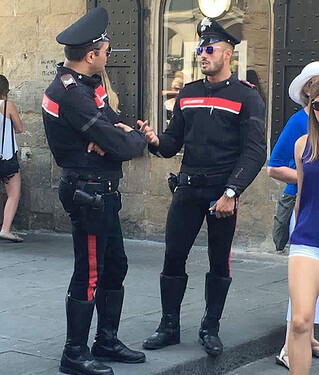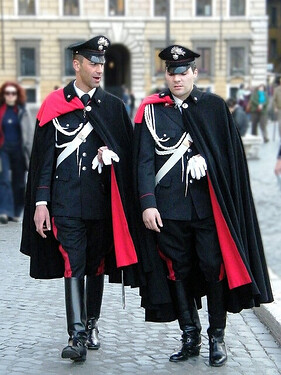Something that has fascinated me for a while and caught my curiosity and interest some time ago, is the way some laws work in the US as opposed to in Italy, where I live.
I started watching (I really don’t recall how it happened) first amendment audits on youtube, and eventually transitioned from bs channels to consuming more informative video formats (channels like Audit the Audit, where police interactions are broken down and analyzed citing laws in lots of detail and whatnot). As I learned more and more about how some laws work in the US (I do realize that there is variance between states), as well as what police interactions tend to look like, I couldn’t help but notice how different a lot of those things are from the way everything works in Italy.
In this thread, I’d like to highlight some of those differences, discuss them, and get some more insights from you guys about these things really work where you live. If I recall correctly, there are some members who are in law enforcement, so I’d be particularly interested in their thoughts.
This is not even limited to the US; anything goes.
So, first things first–per my understanding, the police can’t generally stop someone (whether a pedestrian or motorist on the road) and demand to identify them, unless there is some basis for it (reasonable suspicion). In Italy, it works nothing like this. Stopping and identifying random people on the street is one of police’s most common activities. It’s called a “documents check.” The police can stop you if you’re walking down the street and you have to either give them your ID or full name and date of birth. This is done to supposedly make sure you aren’t a criminal or something… I still have to figure out the purpose that serves. Likewise, the police can pull any motorist over and do a “document check,” there doesn’t have to be any traffic infraction to trigger that.
In fact, a very common thing in Italy is for police to stay on the side of a road, and start a posto di blocco (literally, a “stop spot”). The officer will hold something like the thing in this pic:

and signal a car/motorbike to pull over. Judging from what I’ve seen on the internet, I can only imagine that if an officer approached someone walking on the street and demanded to see their ID, they would probably get laughed at. Here, to my knowledge, failing to identify carries a sentence of up to 2 years (although, in practice, I am almost certain that has never happened in the history of my country).
Interestingly enough, at the same time we have very rigid privacy laws. You cannot film people in public and put that on the internet without blurring their face. Anywhere you go, if you submit any personal data (say a work résumé), you have to sign papers in which you confirm you agree to your data being collected. You can sue somebody if they record you and share it with anybody. You get the idea.
Another difference I noticed is there doesn’t seem to be a “contempt of cop” crime in the US, whereas flipping off a police officer in Italy (or insulting them) will get you charged. Note the same isn’t, in general, true for regular citizens. You can’t be charged for flipping off someone who isn’t a policeman.
Which brings me to: even when committing a crime, you will likely not be arrested on the spot, but rather you’ll be identified and reported, and later prosecuted (much later, possibly). Handcuffs aren’t common here and to my knowledge, the police cannot cuff you if they haven’t arrested you formally (no cuffs for detainment).
The police will never call you “friend”, “brother”, “bud,” or anything like that here. I have seen that very often in US police encounters online.
They also get in trouble very, very easily if they ever shoot. Most police officers don’t ever shoot during their whole career.
On this last point, I’d like to also share a video that is relevant. The video isn’t graphic at all, but does show a police officer shooting. If this is deemed to be against the rules, the mods will remove it, but really, there is no blood or anything.
This is something that recently made it to the news in Italy. A guy brandishing a knife in Rome was apprehended by the police, and they had to shoot him in a leg to stop him. The guy wasn’t seriously injured or anything.
Yet, the officer who shot him has had his service weapon seized as evidence and is currently being charged with, hmm, I’m not sure what crime to be honest, but he is going to go to trial for what he did, which is honestly mind-blowing to me.
So here’s the video
Having seen some body cam footage (which, by the way, isn’t a thing in Italy) from similar encounters in the US, I can only imagine what US officers would have done–righteously, in my opinion–in this instance. And they surely wouldn’t have been prosecuted.
As a closing point, I want to remind you that the Italian constitution does share most of the values and principles of that of the US–freedom of speech, person freedom in general, and so on. I just thought it’d be interesting to compare how those principles end up being applied in practice, at two ends of the world.
Comments are appreciated.




